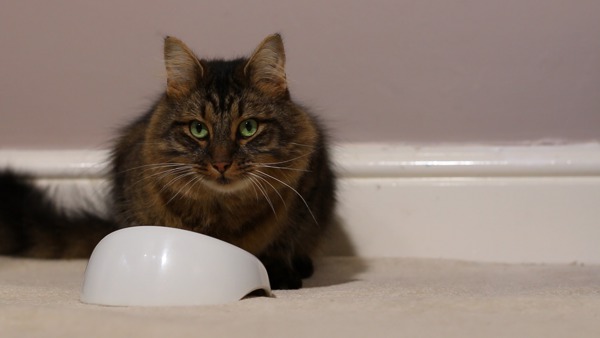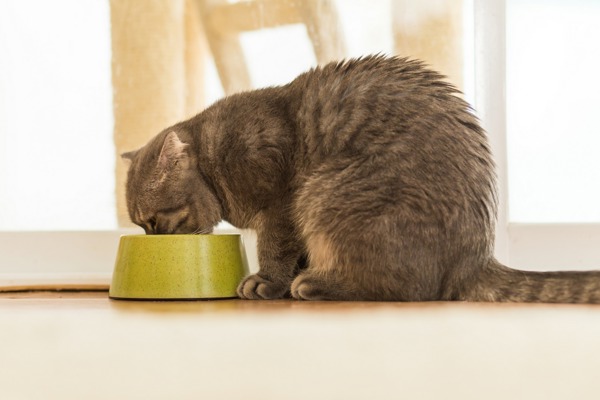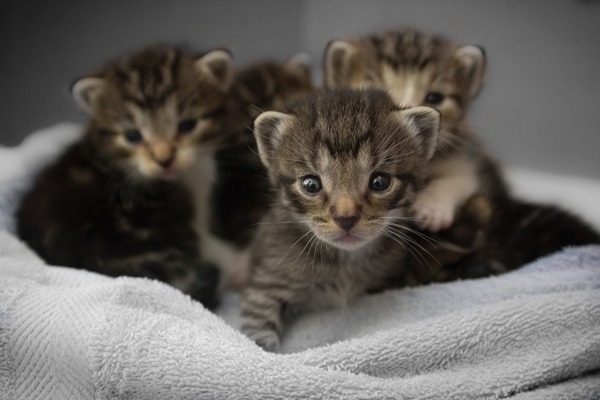Feed Cats How Many Times a Day
Concerned about what to feed your cat? Learn more about your cat's nutritional needs in our cat feeding guide.
5 important things about feeding your cat
- Feed your cat a complete food that's suitable for their life stage, eg kitten, adult or senior cat – the food packaging will advise which life stage it is aimed at.
- Follow the instructions on the food's packaging for how much to feed and how often
- Don't feed your cat a vegetarian or vegan diet. Cats are obligate carnivores: this means that there are certain nutrients essential to cats that are only found in meat. If they are fed a diet that does not contain meat they can get very unwell.
- Use feeding enrichment toy to keep your cat occupied and make feeding more enjoyable - you can even make your own enrichment toys
-
Speak to your vet if you have any diet questions or you're concerned about your cat's weight.
For more information on what, how much and how often to feed your cats, our helpful video has all the answers, including how to keep your cat healthy and not overfeed your cats.

How much should a cat eat?
You should read the instructions on your chosen cat food for detailed information on how much you should feed your cat. You will also need to change the amount of food for kittens, adult cats and senior cats, so make sure you take this into consideration. For example:
- Kittens
Kittens have small stomachs and high energy needs, so they need to be fed little and often. Remember to check their food and replace it four times a day. It is imperative they are fed specific kitten food which provides nutrients required for growing and is more energy dense.
- Adult cats
Your cat is an 'adult' when they are between one and eight years old. Your adult cat needs to be fed once or twice a day, but some will regulate their food intake, so their daily ration can be left out, particularly if you give them dry food.
- Senior cats
Cats over eight are considered 'senior'. As your cat grows older, their nutritional needs change and you can buy special foods that cater for them. These foods may have less protein and a balance of minerals and vitamins designed to keep them in good health.

What should I feed my cat?
Head to your nearest supermarket's pet food aisle and you'll find plenty of cat foods to choose from. But with so much on offer, how can you decide what is best for your cat?
Before you buy, remember to choose food specially formulated for cats. Dog food simply isn't suitable and food intended for humans doesn't necessarily include all the nutrients that your cat needs. The best food for your cat (unless they have special dietary needs) is likely to be a complete cat food from a reputable brand. Your vet will be well placed to guide you to the best food for your cat.
Homemade cat foods might be good for occasional treats, but it is very difficult to give your cat the right balance of proteins, vitamins and minerals your cat needs to thrive – unless this has been recommended by your vet.
Vitamin supplements aren't necessary if you are feeding your cat good quality cat food - unless recommended by your vet too. Vitamin supplements could cause a dietary imbalance which could harm your cat – always speak to your vet about any food supplements first.
What treats can I feed my cat?
Every cat-owner will be all too aware that cats love treats. If you do opt to give your cat treats, make sure you limit the amount throughout the day so they don't gain weight. Treats specially formulated for cats are a much better option than leftovers or raw meat, although a small amount of cooked chicken or fish is fine.
Food enrichment puzzles and toys are great ways to keep your cat occupied as well as limiting their treat intake. Alternatively, why not treat your cat to a little extra attention or play time? You'll strengthen the bond between you and your cat, without the potential weight gain.

Special diets
Cats need different foods at different stages of their life, which is why we recommend feeding an appropriate life stage diet. From specially formulated kitten food to senior, indoor and low calorie. Your vet might prescribe a prescription diet if you cat has a health problem, like kidney disease or joint problems, or if they are particularly overweight. Before you decide to try a new diet with your cat, is it always important to speak to your vet.
Can cats eat vegetables?
Cats are meat eaters, making vegetarian and vegan diets unsuitable for their needs. Your cat needs more protein than many other mammals and they need specific amino acids such as taurine in order to survive. This is why it is important to feed your cat food that is made just for them.
There are a few vegetables that you can feed your cat (if they're keen!) These include: carrots, peas, corn, broccoli and spinach. Steer clear of garlic and onion as these can be difficult to digest and can make cats very ill.
Can cats eat cooked chicken?
One common question that many cat owners ask is whether it is ok to feed their cat chicken. Cats are carnivores, which means they are meat eaters and in the wild will eat raw meat in the form of their prey. For your pet cat, always ensure that any chicken you feed them is cooked - preferably boiled and does not contain any bones. Remember to include chicken as part of your cat's daily treat allowance, fed in conjunction with a balanced diet. Feeding only cooked chicken long term can lead to nutritional deficiencies.
Is chocolate poisonous to cats?
While most human treats should be avoided, chocolate is a complete no-no for cats. Just 2g of chocolate – not even as big as a square – is enough to do serious damage to your cat due to its levels of theobromine. Theobromine acts as a stimulant, increasing the heart rate and acting as a diuretic to increase the loss of bodily fluids. As cats struggle to metabolise theobromine, the chemical stays in the bloodstream and quickly reaches dangerous levels.
Keep chocolate out of reach of your cat, and if you suspect they have eaten any chocolate, head to the vet straight away.
Find out more about poisoning
How to get your cat to eat
Cats are clever. You might have noticed that if they don't like the food they're offered, they can wait for a while until something they prefer is provided. Some cats are fussier than others, and some can stop eating due to illness or stressed. If your cat is off their food and this is unusual, make sure you see a vet to rule out any underlying illnesses or behavioural problems.
You can encourage your cat to eat by:
- offering different wet and dry foods at different times, and introduce new foods slowly
- giving wet food at room temperature, instead of straight from the fridge
- offering small, regular amounts of food rather than a large portion – this is less overwhelming and ensures the food is always fresh
- offering food with a strong odour. Warming it up can increase the scent, but be careful not to make it too hot!
- adding a drop of tasty yeast extract spread, fish oil or kitten food to your cat's meal. This can make food more appetising but shouldn't be done regularly. Ask your vet for more advice.
- sitting down with your cat, or hand feeding them. This can induce their appetite. Try a small amount of chicken and fish as a treat if they're struggling.
When to call the vet
Watch out for changes in your cat's eating and drinking behaviour, as this could indicate that something is wrong. See your vet if your cat:
- normally eats well but suddenly stops
- has not eaten for 48 hours
- develops a ravenous appetite
- will only eat with one side of their mouth
- makes a grinding noise when they eat
- starts drinking noticeably more than usual
- loses weight for no apparent reason
- is vomiting or has diarrhoea
Regular eating and drinking is essential to your cat's health. If your cat doesn't eat, even for a few days, they can develop a condition of the liver which can be fatal in severe cases.
How often should I feed my cat?
If your cat is older than 6 months old, they should be fine if fed two times a day. Once your cat is older than one year, they should be fine only being fed once a day but this can differ with each cat and they might still need feeding twice.
Is my cat obese?
Making sure your cat eats healthily and exercises regularly is important to keep them in good health. While you can help a cat lose weight, prevention is better than cure. If you're concerned about your cat, take a look at our guide on obesity, where you'll find a chart to determine if your cat is overweight.
Find out more about cat obesity
Pregnant cats and mum feeding kittens
If you've got a pregnant cat or a cat that is feeding her new kittens, you'll need to provide additional nutrients and the same high-protein kitten food as weaned kittens.
Give your pregnant cat unlimited access to kitten food, as well as a supply of fresh drinking water. While you might notice that during pregnancy, she may only eat a little more than usual; she might eat double or triple the usual amount of food when she is suckling kittens.
For more advice on pregnant cats, read our guide.
Caring for your pregnant cat guide

What can I feed my kitten?
By providing your cat with a balanced diet during her pregnancy and while she is suckling, she'll be able to feed her kittens until they are weaned – between six to eight weeks old. Begin the weaning process by offering well-mashed kitten food from three to four weeks of age. If you've got a large litter of kittens, you might have to supplement the kitten's diet with special kitten milk at an earlier age.
If the kitten's mum is unable to feed her young, or the kittens are orphaned, you'll need to take over the feeding completely.
For more advice on hand feeding kittens, read our guide.
Hand rearing kittens guide
Source: https://www.cats.org.uk/help-and-advice/diet/feeding
0 Response to "Feed Cats How Many Times a Day"
Post a Comment